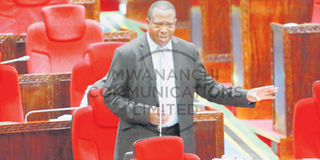Legislators raise concern over govt budget funding strategy

The minister of Finance and Planning, Dr Philip Mpango, speaks during a parliament session in Dodoma yesterday. PHOTO | EMMANUEL HERMAN
What you need to know:
- They have urged the government to widen the internal tax base to avert problems in the future.
- A report tabled yesterday by the Parliamentary Budget Committee noted that one of the main reasons for low financing of development budget was delays in accessing foreign funds, which include grants, development project loans and non-concessional borrowing.
Dodoma. Lawmakers yesterday raised questions over the financing of the development budget in the current fiscal year, and warned the government faces tough challenges ahead to meet its targets.
They have urged the government to widen the internal tax base to avert problems in the future.
A report tabled yesterday by the Parliamentary Budget Committee noted that one of the main reasons for low financing of development budget was delays in accessing foreign funds, which include grants, development project loans and non-concessional borrowing.
The report covered the first quarter of the 2016/17 fiscal year (July-September 2016).
Presenting the report, the committee vice chairperson, Mr Josephat Kandege (Kalambo-CCM), said by September 2016, donor partners had injected only Sh285 billion, which was only 16 per cent of the target for the quarter.
According to a recently released Bank of Tanzania’s Monthly Economic Review for December, the funds reached Sh328 billion, a far cry from the target of Sh1.01 trillion for the first five months of the current fiscal year.
“This trend shows that we are still facing a great challenge of financing our budget by depending on donor partners,” said Mr Kandege. “There is a great possibility that we will fall short of our targets, especially on the execution of development projects.”
Some of the worst-hit institutions, by the end of quarter one of the budget year were the National Assembly, National Irrigation Commission, Ministry of Livestock and the Fire Brigade, which received not even a single penny for their development projects. Another setback to the budget financing, according to the report, is the exponential growth of the national debt. The committee noted that, in a span of one year the debt grew by 18 per cent, from $19.69 billion in June 2015 to $23.2 billion in June 2016.
“Although the government continues to insist that the national debt is sustainable, an 18 per cent growth in just a year is very alarming and might force the government to inject a substantial chunk of its revenues to service the debt , a situation which is definitely affecting the budget financing,” said Mr Kandege.
Debating the report, Maswa East MP Stanslaus Nyongo (CCM) said funding of the development budget was not looking good. “The ministry of Industries, Trade and Investments has so far received only 10 per cent of its development budget, while the Prime Minister’s Office-Environment received zero per cent…when we plan our budget, we should be realistic; we moved from Sh22 trillion last year to Sh29 trillion this year, but still, we’re facing execution challenges,” he said.
“If we knew that the bigger chunk of the national debt was maturing why was this not forecasted in the budget; that is a serious omission.”
Kigoma South MP Hasna Mwilima (CCM) said: “Out of Sh9 billion for development projects for the Ministry of Water, only Sh2 billion has been disbursed so far, and we are now in the middle of the fiscal year.”




